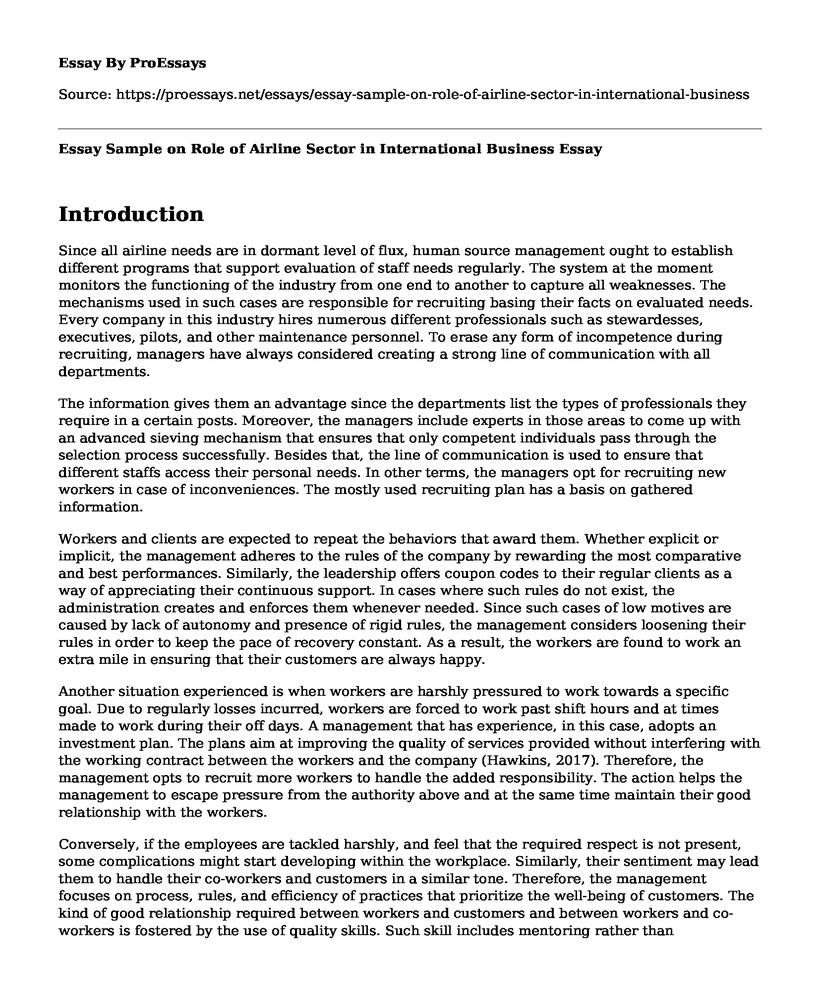Introduction
Since all airline needs are in dormant level of flux, human source management ought to establish different programs that support evaluation of staff needs regularly. The system at the moment monitors the functioning of the industry from one end to another to capture all weaknesses. The mechanisms used in such cases are responsible for recruiting basing their facts on evaluated needs. Every company in this industry hires numerous different professionals such as stewardesses, executives, pilots, and other maintenance personnel. To erase any form of incompetence during recruiting, managers have always considered creating a strong line of communication with all departments.
The information gives them an advantage since the departments list the types of professionals they require in a certain posts. Moreover, the managers include experts in those areas to come up with an advanced sieving mechanism that ensures that only competent individuals pass through the selection process successfully. Besides that, the line of communication is used to ensure that different staffs access their personal needs. In other terms, the managers opt for recruiting new workers in case of inconveniences. The mostly used recruiting plan has a basis on gathered information.
Workers and clients are expected to repeat the behaviors that award them. Whether explicit or implicit, the management adheres to the rules of the company by rewarding the most comparative and best performances. Similarly, the leadership offers coupon codes to their regular clients as a way of appreciating their continuous support. In cases where such rules do not exist, the administration creates and enforces them whenever needed. Since such cases of low motives are caused by lack of autonomy and presence of rigid rules, the management considers loosening their rules in order to keep the pace of recovery constant. As a result, the workers are found to work an extra mile in ensuring that their customers are always happy.
Another situation experienced is when workers are harshly pressured to work towards a specific goal. Due to regularly losses incurred, workers are forced to work past shift hours and at times made to work during their off days. A management that has experience, in this case, adopts an investment plan. The plans aim at improving the quality of services provided without interfering with the working contract between the workers and the company (Hawkins, 2017). Therefore, the management opts to recruit more workers to handle the added responsibility. The action helps the management to escape pressure from the authority above and at the same time maintain their good relationship with the workers.
Conversely, if the employees are tackled harshly, and feel that the required respect is not present, some complications might start developing within the workplace. Similarly, their sentiment may lead them to handle their co-workers and customers in a similar tone. Therefore, the management focuses on process, rules, and efficiency of practices that prioritize the well-being of customers. The kind of good relationship required between workers and customers and between workers and co-workers is fostered by the use of quality skills. Such skill includes mentoring rather than supervising. The explanation behind the difference between the two practices comes in the form of induction. For instance, supervising demand a lot of monitoring without given the workers a chance to take a break or discuss some issues with their co-workers. An effective supervision method of management is ignored since it sometimes sound like dictatorship. Alternatively, the administration in the airline industry has majored in mentoring their employees. Different mentoring techniques are exercised in order to make sure different employees are sorted. Obviously, the orientations and other lessons are taken in groups basing on area of expertise. Professional human resource management teams have been able to handle such cases through orientations and practicing democratic decision making method. Democratic method of decision making allows all members of the organization to work together from goal setting all the way to work station. In this case, all members free to make a essential changes without considering her minor post. The practice has been used to motivate all employees hence promoting team work.
Conclusion
In conclusion, the airline sector is the most crucial factor which enhances the meaning of international business. The field has been used by every country to connect its people with the rest of the world. In this case, all governments have shown consistent support of the industry despite being reported to make huge losses. Besides monitoring the departments, human resource management should consider mentoring their team to achieve the required competence level.
References
Bratton, J., & Gold, J. (2017). Human resource management: theory and practice. Palgrave.
Bailey, C., Mankin, D., Kelliher, C., & Garavan, T. (2018). Strategic human resource management.
Oxford University Press.Hawkins, F. H. (2017). Human factors in flight. Routledge.
Cite this page
Essay Sample on Role of Airline Sector in International Business . (2022, Oct 14). Retrieved from https://proessays.net/essays/essay-sample-on-role-of-airline-sector-in-international-business
If you are the original author of this essay and no longer wish to have it published on the ProEssays website, please click below to request its removal:
- Feminine Identity Essay Example
- International Business and Walmart Paper Example
- Essay Sample on Cultural Relativism and Ethical Imperialism in Business
- Research Paper on Parenting Styles and Discipline Techniques
- Intercultural Communication & Negotiation: Adapting Skills in a Global Setting - Essay Sample
- Essay Example on Organizational Ethics: Building an Ethical Culture
- Annotated Bibliography Example on School Uniforms, Discipline, & Academic Performance







